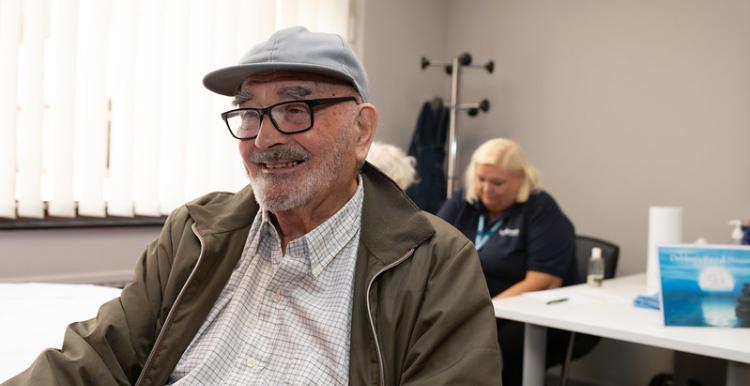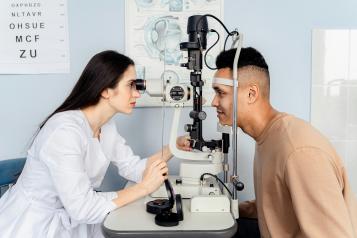Eye care costs a barrier for people on low incomes

Highlights of our research
- NHS vouchers to help meet eye care costs has fallen by over 30% in real terms, putting pressure on high street opticians to cover costs in other ways.
- People describe regular visits to the opticians as vital in maintaining eye health, but some avoidable eye care problems risk not being identified if costs are putting some people off attending appointments.
- We're calling for a review of eye care support, to ensure additional costs do not deter those on the lowest incomes from visiting opticians.
An estimated 50% of sight loss is avoidable. That's why it’s vital that people can have their eyesight tested regularly and get the help they need if there is a problem.
Yet our new research found that costs associated with visiting opticians are deterring those on the lowest incomes from getting regular eye tests.
We carried out our online survey of people’s eye care experiences between July and September 2024, following concerns people shared with us about the cost of eye care. We found one in seven, 14%, of people who responded to our self-selecting survey had avoided eye care due to cost in the last two years.
People who described themselves as ‘not at all comfortable financially’ were much more likely to say they avoided going to opticians than those who were financially very comfortable (39% vs 3%). Lack of awareness of the financial support available may exacerbate the high rate of people avoiding eye care.
Additional costs may put off patients
As people face rising eye care costs and lack of financial support, many high street opticians, which are private businesses, increasingly rely on generating income through offering services in addition to eye tests.
Our survey found that of those who had attended an eye test in the last two years, 72% had experienced staff offering additional services at a cost.
This practice has made some people reluctant to visit optician services at all. Those who said that opticians had offered them additional paid services were twice as likely to say they had avoided getting eye care in the last two years compared to those who had not experienced this (17% vs 8%).
Most (84%) of the respondents to our survey were eligible for free eye tests. However, as the results of our survey show, many people eligible for financial support for their eye care may find it difficult to afford additional costs. They may put off getting eye care because they are concerned about being pushed into paying for products or services they can’t afford.
In recent years, the real-terms value of NHS optical vouchers has also dropped by over 30%, and the value of the NHS sight test fee by even more. This, alongside significant changes to eligibility for some benefits, puts pressure on both customers and opticians.
Our Chief Executive Louise Ansari said:
"Regular visits to the optician are essential to help keep your eyes healthy and identify any issues. However, there are clear signs that the extra costs people face could discourage those struggling financially from visiting opticians.
"NHS funding to help meet eye care costs has not kept pace with inflation, which, in turn, is causing high-street opticians to rely more on selling additional services to make their businesses viable.
"It is essential that this situation does not impact on the those most disadvantaged in society. This is why the Government needs to review the help available for those on the lowest incomes and ensure that more people are aware of how the NHS can help meet the costs of eye care."
We set out the following steps to protect people from the rising impact of eye care costs:
- The Department of Health and Social Care should review support for the costs of NHS eye care for those on the lowest incomes.
- The Government and the NHS should consider a targeted communications campaign through direct channels to low-income eye care patients.
- The primary eye care sector should have clear guidelines for how staff should assist those on lower incomes without affecting their confidence in seeking care.
Seeing clearly? Attending sight tests and accessing opticians
Our new report warns that costs for additional services when visiting opticians are a barrier to care for people on low incomes.

